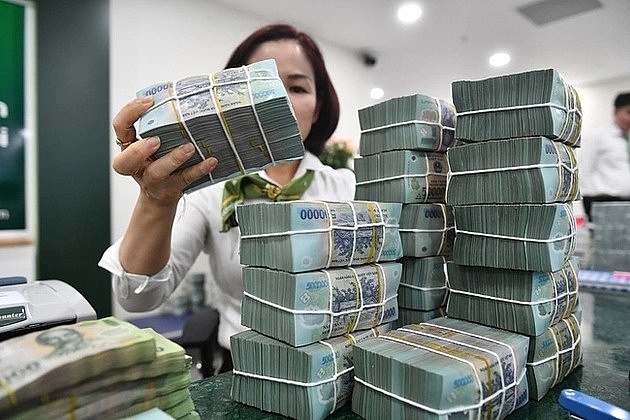Financial discipline boosted through state budget agenda
Under a National Assembly (NA) resolution released over a week ago on estimates for 2025, the total state budget revenues are set to reach about $82 billion – up 15.6 per cent as compared to the estimates in 2024 and up 5 per cent as compared to the estimated implementation this year.
 |
| Financial discipline boosted through state budget agenda, photo Dan Tri |
Meanwhile, the total state budget spending for 2025 is set to stand at as much as $106.2 billion, up by about more than $17 billion over the estimates for 2024. This will ensure sufficient demands for investment into infrastructure projects of national importance, for paying salaries in the public sector, and for other already-promulgated policies and mechanisms.
The total state budget deficit for 2025 will be $24.25 billion, which is tantamount to 3.8 per cent of GDP, and will “still ensure safe thresholds for public debt, government debt, and the country’s debt”.
This will include a central budget overspending of $18.46 billion, equivalent to 3.6 per cent of GDP, and a local budget deficit of $5.79 billion or 0.2 per cent of GDP. To support this, the government expects to borrow $34.83 billion next year.
For 2024, total state budget revenue was set at $71.78 billion, including $35.98 billion for the central budget and $35.8 billion for local budgets. This is slightly below the realised revenue of $72.48 billion in 2023. An additional $803.3 million from localities, previously unspent on public sector salary reforms, was carried over into 2024 for the same purpose.
Total central budget expenditure for 2024 is expected to reach $51.7 billion, with nearly $18 billion allocated as supplemental funding for local budgets.
The 2024 state budget estimates were based on assumptions of 6-6.5 per cent GDP growth and 4-4.5 per cent inflation. However, the government now forecasts GDP growth of around 7 per cent, supported by improved domestic production and exports.
The Ministry of Planning and Investment (MPI) has outlined measures to enhance financial discipline and strengthen state budget management in the coming year. These include expanding the tax revenue base, combating tax revenue losses – particularly in e-commerce – and increasing digital transformation in budget management. Efforts are aimed at achieving state budget revenue growth of at least 5 per cent above the estimated 2024 implementation.
“Besides drastically boosting digital transformation in budget management and applying electronic invoices, the government will continue expanding tax revenue bases and fighting against revenue losses,” the MPI stated in its report. “Efforts will focus on achieving state budget revenue about 5 per cent higher than the estimated implementation for 2024.”
Expenditure reductions will focus on saving recurrent spending while prioritising investments in development and social security.
The government will further intensify crackdown on corruption and interest groups, in line with regulations issued in October on power control, anti-corruption, and combating negative behaviours in Party inspection, supervision, and disciplinary actions, as well as in inspection and auditing activities.
A focus will be placed on inspecting sensitive sectors with high risks of corruption or fields with a lot of public opinions about corruption and negativity, and on conducting inspections of the responsibility of leaders in implementing laws on anti-corruption. In addition, cross-inspection, cross-examination, and auditing activities will continue being implemented.
| Ho Duc Phoc, deputy Prime Minister Minister of Finance Monetary policy and fiscal policy can be said to be the driving force of economic development. However, on the contrary, when the economy grows or declines, these policies will directly affect the system of credit institutions, banks, and the state budget. The management of these policies over the past has been reasonable. Monetary policy has been managed proactively, promptly, flexibly, and effectively. The fiscal policy has been implemented in an open and reasonable manner, so the results achieved over the past can be said to be good. For example, over the past four years, our budget revenue has exceeded about $41.67 billion with an increase recorded year after year. We have reduced taxes for businesses and individuals by over $33 billion. Thus, if under normal conditions, the revenue would increase by about $83.3 billion. So this is a very effective and reasonable fiscal policy. In monetary policy, we have maintained the exchange rate between USD and VND. We have dealt with two zero-VND banks and are preparing to do so with another two banks. We have stabilised the banking system and served the economy well. Even if this year, our GDP reaches nearly 7 per cent, the consumer price index increases only 3.9 per cent, and public debt accounts for 37 per cent of GDP, the state budget revenue has already reached 99.4 per cent compared to the estimate assigned by the National Assembly. This is 17.8 per cent higher than the same period last year. Thus, budget revenue has increased compared to the implemented figure of $9.38 billion last year. This year, we expect to exceed this by at least about $12.5 billion, which will help supplement more capital into the economy to invest in building infrastructure projects. |
 | State budget balance needed following VAT decision Businesses in Vietnam will continue to enjoy an 8 per cent VAT rate until the year’s end following an extension to the rate cut, which will cause a decrease in state budget revenues. |
 | Key sectors contributing towards state budget surplus The state budget has experienced a surplus so far this year, driven by an increase in revenue from export and import activities, rather than crude oil. |
 | Public debt indicators remain in alignment with expectations The country is projected to keep its public debt within safe levels this year, with a significant state budget surplus recorded in the first nine months of 2024, although a deficit is forecasted for the full year. |
What the stars mean:
★ Poor ★ ★ Promising ★★★ Good ★★★★ Very good ★★★★★ Exceptional
 Tag:
Tag:
Related Contents
Latest News
More News
- Banking sector targets double-digit growth (February 23, 2026 | 09:00)
- Private capital funds as cornerstone of IFC plans (February 20, 2026 | 14:38)
- Priorities for building credibility and momentum within Vietnamese IFCs (February 20, 2026 | 14:29)
- How Hong Kong can bridge critical financial centre gaps (February 20, 2026 | 14:22)
- All global experiences useful for Vietnam’s international financial hub (February 20, 2026 | 14:16)
- Raised ties reaffirm strategic trust (February 20, 2026 | 14:06)
- Sustained growth can translate into income gains (February 19, 2026 | 18:55)
- The vision to maintain a stable monetary policy (February 19, 2026 | 08:50)
- Banking sector faces data governance hurdles in AI transition (February 19, 2026 | 08:00)
- AI leading to shift in banking roles (February 18, 2026 | 19:54)





















 Mobile Version
Mobile Version